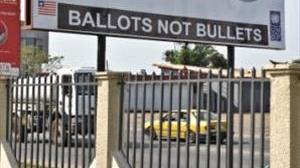Surmounting severe obstacles posed by poor roads and difficult-to-reach communities, the National Elections Commission (NEC) of Liberia has successfully carried out a nationwide registration of eligible voters while preparing for a constitutional referendum and the presidential and parliamentary elections due later in the year. The exercise, conducted from 10 January to 12 February 2011, marked the first phase of a challenging electoral process for Liberia’s national institutions which are leading the elections process by themselves for the first time since the end of the civil war.
Despite these challenges, NEC successfully distributed election materials to 1,780 registration centres across the country and then was able to complete the registration process without any major glitches. The NEC had the technical support of the United Nations Development Programme and logistical assistance from UNMIL to airlift registration materials to remote areas.
“The NEC has shown that it is committed to ensure the process succeeds. Of course there have been, as usual, some challenges here and there but those challenges have not been insurmountable. With the collaboration that we have had, and working closely with the NEC, it has been possible to get over some of the challenges,” says Ademola Araoye, UNMIL’s Chief of Political Policy and Planning.
Elizabeth Nelson, the Deputy Chairperson of NEC said their success so far has been largely due to long-term planning which began years earlier. “Since 2006 we have been planning for the next elections to be held in 2011, and so there have been massive preparations towards this.”
Aside from the just completed voter registration exercise, the NEC has a long list of activities to accomplish including the ongoing registration of political parties, the delineation of electoral districts, a constitutional referendum and, finally, the presidential and legislative polls as well as possible runoffs.
The successful completion of the registration exercise would go a long way in ensuring free and fair elections, said Araoye. “If you don’t get the voter registration right then you can’t get the elections right. Voter registration is essentially to ensure that every eligible citizen is enfranchised, to ensure that the structures are in place. So it’s a very critical stage,” he said.
According to Nelson, moving election materials to remote places was one of NEC’s biggest challenges but UNMIL’s help to airlift the materials resolved the issue. “The assistance that UNMIL has given us has tended to ease one of the biggest challenges that we had.” UNMIL’s help involved Ukrainian peacekeepers airlifting 8.3 tonnes of registration materials to sites in Greenville, Harper, and Barclayville in the Southeast and Kolahun in Lofa. A second phase entailed the distribution of the materials by helicopters from the four main hubs to five remote locations. A NEC staff was on board of all UNMIL flights to ensure a chain of custody of the electoral material.
The voter registration materials were packaged in the form of kits and included cameras for the voter identification cards, solar panels and background cloths, and optical mark recognition instruments for entering the details of voters as they registered. Each kit weighed about 46 kg. UNMIL also helped transport officials of NEC and the Liberia National Police who were in charge of monitoring and securing the election materials.
“NEC is in charge of the election process with UNMIL playing a supportive role,” said Araoye. After being the primary organizer of Liberia’s elections in 1997 and 2005, the United Nations, in line with the drawdown of UNMIL and the international community’s increasing confidence in Liberia’s ability to manage its own affairs, is playing only a supportive role in the forthcoming elections.
Asked about the relationship between UNMIL and NEC, Fromoyan said: “It has been perfect really. We have had full cooperation with them. Prior to even this moment, since we took over, all the by- elections that we have had, they have always given support.” He said NEC expected the smooth relationship with UNMIL to continue throughout the election process.
Aside from logistical support, UNMIL is also mandated to help Liberian institutions strengthen their capacity to organize national elections in the years to come. “The whole idea is to strengthen the capacity of the NEC to be able to conduct the elections autonomously and also to be able to do this in the future without dependence on international support. So this as a test run of the capacity, and since it is a test run, we are here to fill in the gaps to help them achieve the capacity,” said Araoye.
The ultimate objective, says Fromoyan, is to conduct an election that has legitimacy in the eyes of all the stakeholders, especially the people of Liberia. “If we succeed in having credible elections, as we certainly believe we will, then the efforts of our international partners and all Liberians who are committed to the democratic process will not be in vain. That is one of the major things that we are all mindful of in undertaking this herculean task that we have on hand.”





